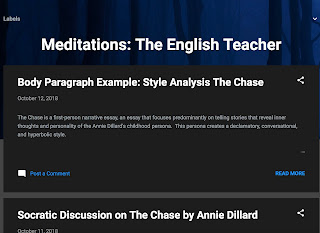It stands to reason that anyone who isn't a professional reader (teacher/professor/editor/literary critic, e.g.) is an amateur. One connotation of the word
amateur is a person who doesn't get paid for a particular talent. In a culture that overwhelmingly--and often erroneously--associates value with money, an amateur is often considered less proficient than a professional who gets paid for doing the same thing.
But it's the second connotation of
amateur that makes something worth doing and life worth living. The word comes from a French derivation of the Latin verb for "love." Amateurs love what they do. In fact, amateurism is often defined as,
"the philosophy that elevates things done without self-interest above things done for pay." In this sense, although I have been paid for teaching, consulting, researching, and writing about learning for nearly 25 years, I am a proud amateur.
I'm thinking about this now because of some recent discussions with students about reading. I understand how important it is to read what you love and to think about the text in your own way. When I read for pleasure I want to suspend my disbelief and lose myself in the story. I imagine the characters so intensely that sometimes when I turn the last page I actually miss them a little. The furthest thing from my mind is whether I can write an essay explaining the author's tone or theme with a thoughtful analysis of genre or techniques like
anaphora or
synecdoche. In fact, analyzing a text in that way distracts me from most of what makes me want to pick up a book in the first place.
We are not alone in thinking this sort of analysis can make a person fall out of love with reading:
However, at this point in history it's easier to portray that idea in a movie, where appreciation of the beautiful approximates
Schopenhauer's pure intellect free of any worldly agenda, than in a real-world classroom where the pressures of life so often intrude. Still, we all want to ensure successful outcomes on exams, transcripts, etc. This demands that we account for our understanding of the tools and techniques authors use to convey their ideas and connect with our experience. So, in addition to seeing a novel or poem as a work of art that speaks to the human condition:
you will also need to analyze technical elements of composition to form arguments based on your understanding of academic principles of writing.
Now, you may or may not be interested to know that
Leonardo Da Vinci used over 30 layers of paint to add only about half a hair's depth to a painting that looks like it has no brushstrokes. But millions of people (including me) have stood just feet away from the painting, gawked in amazement, and wondered how Da Vinci did it. For centuries this was considered a mystery of genius. Finally,






